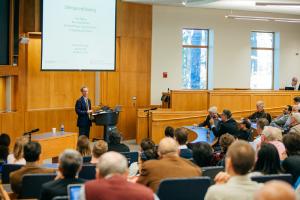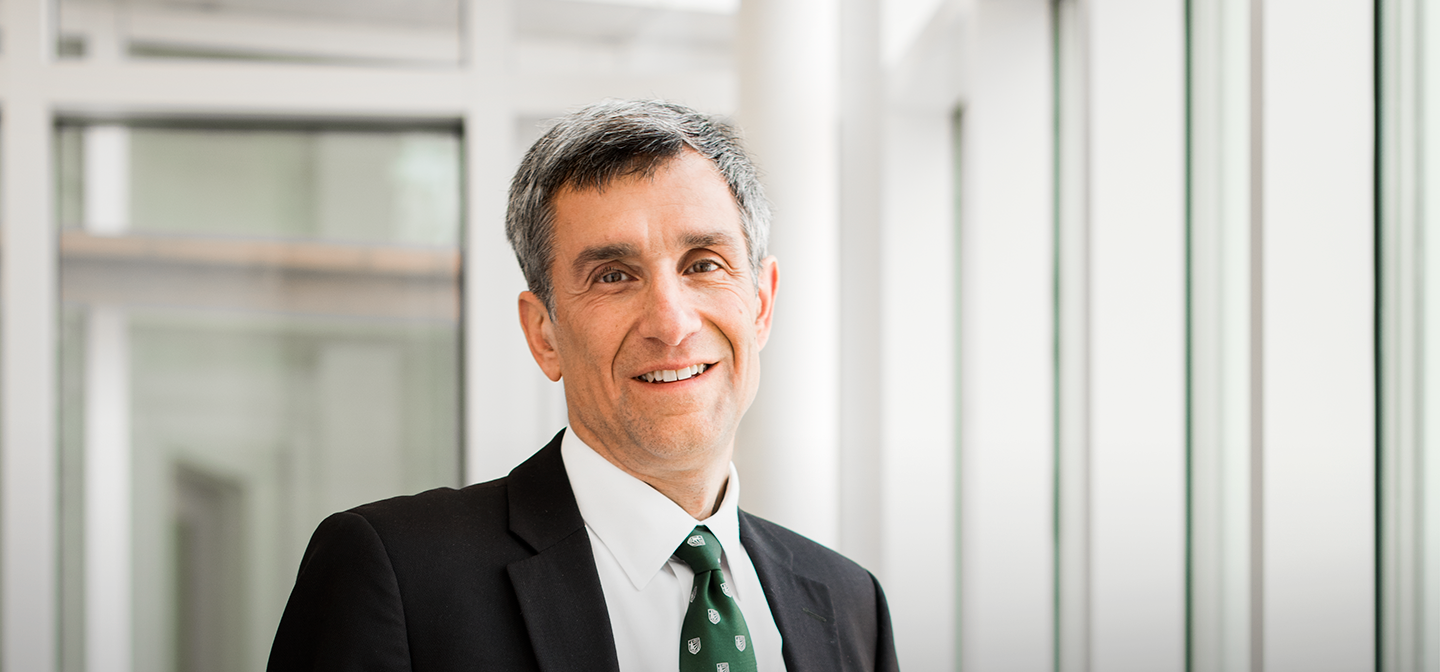
Irving Institute Director's Fund for Excellence
Help the Irving Institute meet the world's energy challenges.
Provost Joseph J. Helble talks about The Call to Lead, liberal arts in the 21st century, and running in the New York City Marathon

After 13 years as dean of Thayer School of Engineering, Joe Helble became provost in October, making him Dartmouth’s chief academic officer. Among his many responsibilities: to make sure Dartmouth’s academic priorities are properly resourced, a central purpose of The Call to Lead campaign. Prior to his tenure at Thayer, Provost Helble worked in the private sector, taught at the University of Connecticut, and researched technology and environmental policy issues in the office of U.S. Senator Joseph Lieberman as the Roger Revelle Fellow of the American Association for the Advancement of Science. A chemical engineer, he is married to Becky Dabora, a bioengineer, and they have two daughters and a son. One of their daughters is a Thayer alumna.
It’s Dartmouth being bold in its ambition but being true to our core institutional values. It’s about supporting faculty who are teachers and scholars and challenging incredibly bright students, giving them opportunities to learn, study, and grow. I’m excited that we’re investing in the teacher-scholar model of education and expanding financial aid so that any student, regardless of background, means, or geographic origin, can come here and be part of this incredible liberal arts educational experience.
First and foremost, it’s the intellectual curiosity of our students. I give our colleagues in Admissions great credit for finding students for whom the Dartmouth educational experience is the right one. These are students who are incredibly smart and inquisitive. Because of that, we tend to attract a faculty who are interested in not only their particular area of scholarship, but equally interested in engaging with students in the classroom, interested in the range of perspectives those students bring.
The liberal arts, at their core, have always been about learning to ask questions that help you understand and engage in the world. As we sit here today, in the early years of the 21st century, and at a time where “technology” impacts nearly every aspect of our lives, I believe a liberal arts education should also give our students the opportunity to understand the human environment—the built environment—and that includes understanding technology. That means they should draw not only from the disciplines that we traditionally consider part of the liberal arts, but also from computation and computer science, from engineering and engineering design.
That’s not to say we aspire to turn every student into an engineer or a computer scientist. We do not. But exposure to those disciplines as part of a broad education will make our students better thinkers and leave them better prepared to engage the world.
Without question. We’re already at the point where 70 percent of our undergraduates take classes in engineering or computer science as part of their education.
If we were to try to do everything, we would succeed at nothing. We have to choose wisely, and we have to start by looking at areas where we have existing and deep faculty expertise. We also need to identify opportunities where Dartmouth can make a distinctive contribution.
A great example is the Arthur L. Irving Institute for Energy and Society. We intentionally established it as an institute looking specifically at the intersection between energy choices and societal impact. Why? There are certainly other universities with energy institutes, but those are focused on technology development, or the environmental impacts of different energy choices. Or they’re exploring energy-related finance.
Those are all important questions. But we’re combining that full range of issues with faculty who are also asking questions about the geopolitics of energy choices, or the impact of current and future energy choices on the global order. That scope and reach—that breadth—is pretty unusual.
Yes. It’s challenging in a great way, and I’m very much enjoying it. Several colleagues who have served as a university provost told me there would never be a boring day. That is absolutely true. Dave Kotz, who served as interim provost, said it was the breadth of the issues, and the complete change of topic from meeting to meeting—the constant frame-shifting, as he called it—that he found most interesting and the most challenging. That has already been my experience.
I love where Dartmouth sits today. We have a sense of mission and a sense of self that are much more clearly and crisply articulated than at any time in my 14 years. We’re presenting ourselves to the outside world, and that means to prospective faculty, staff, and students, confidently and proudly as an institution that is focused on liberal arts at the core as the right way to educate students for a complex world, and the right mindset to apply to incredibly challenging research questions.
Well, a marathon never goes as well as you hope. Miles 20 to 25 were extraordinarily challenging and painful. But I was wearing a Dartmouth running shirt, and I heard so many enthusiastic “Go, Big Green” cheers during that five-mile stretch—that kept me going. This was only the second marathon I’ve run in my life, and it was my first in 30 years, after telling Becky back then that I did not ever want to run another. My oldest daughter, a runner, helped change my mind, and I entered this one with three goals—not hurt myself, enjoy the experience, and perhaps even qualify for Boston. I managed all three, so I think I have another one in my future.